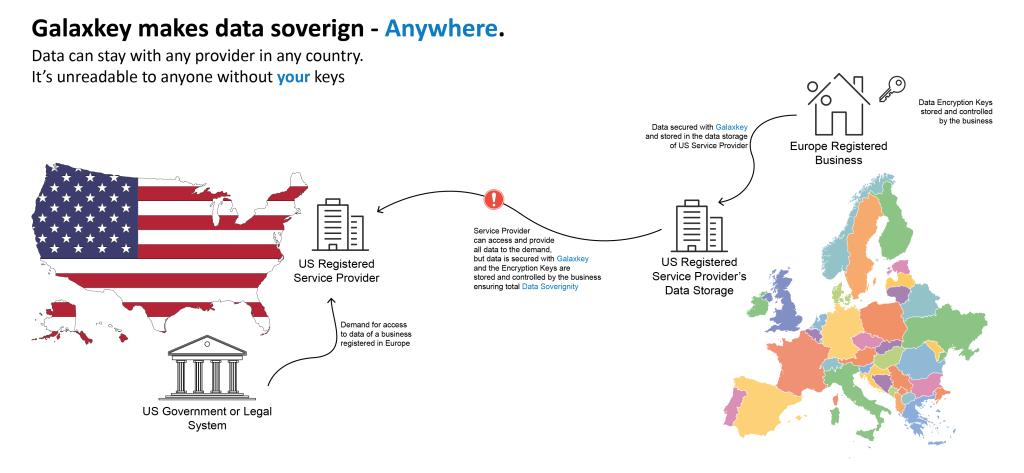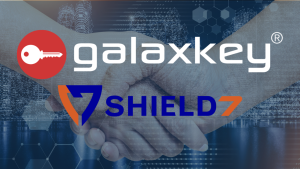The Headlines You Can’t Ignore
In July 2025, Microsoft admitted something that should send shivers down the spine of every CIO, CISO and data protection officer in Europe. Despite multi-billion Euro “sovereign cloud” projects and promises of keeping EU data in EU soil, U.S. jurisdiction still wins. This may apply to other geographies like Middle East, Asia or Africa.
- Quoting Forbes reporting a French Senate inquiry relating to digital sovereignty – Microsoft representative admitted that “the company (Microsoft) resisted requests from the US authorities “when they are not well-founded”, but that under the U.S. Cloud Act, U.S. companies can be forced to hand over data, regardless of where it is stored.”
This is not hypothetical. Under the U.S. CLOUD Act, authorities can compel U.S. companies (both cloud and tech providers like Microsoft or Data Protection companies) to hand over client data, even if it is stored in Frankfurt, Paris, Doha or Riyadh.
The EU’s GDPR and sovereignty aspirations suddenly look fragile when the U.S. government can simply say: “Give us the data.”
Why “Sovereign Clouds” Fall Short
Big cloud and tech providers have invested heavily in “local” offerings to reassure global customers:
- Regional data centers (e.g., in EU or GCC).
- Region-based operations.
- Special “local only” programs like Microsoft 365 Local.
But as Microsoft itself has confirmed, these efforts collapse under the weight of extraterritorial U.S. law. If the parent company is American, the data is susceptible to access without the client’s knowledge. Even with encryption companies headquartered in the U.S., data control isn’t assured – here the sensitive keys fall under similar regulations.
Think about it:
- A French hospital’s records hosted by Microsoft in Paris? Potentially exposed.
- A German manufacturer’s designs on Azure in Frankfurt? Potentially exposed.
- A Saudi financial institution storing sensitive customer details in Google Cloud in Riyadh encrypted by an American provider? Still exposed.
The provider’s assurances fall short when the authorities come knocking. Jurisdiction beats geography.
The Missing Ingredient: Key Ownership
The only way to truly secure your data – regardless of where it lives – is to ensure that nobody but you can decrypt it.
This is where Galaxkey changes the game.
With Galaxkey:
- Your data can remain with any provider – U.S., EU, Saudi Arabia or global.
- It is encrypted before it ever leaves your control.
- You, and only you, hold the encryption keys.
So even if a government agency compels the provider to hand over the data, what they get is useless ciphertext.
It doesn’t matter whether the request comes under the CLOUD Act, the Patriot Act, or any other jurisdictional arm. Without your keys, the data is meaningless.
True Data Sovereignty = Key Sovereignty
The word “sovereignty” has been used loosely in the cloud industry. Too often, it just means “where the data sits.”
But real sovereignty isn’t about where your data lives – it’s about who controls access to it. And access is controlled by keys.
- If your provider has the keys, your sovereignty is an illusion.
- If only you have the keys, your sovereignty is absolute.
This is the defining advantage of Galaxkey.
The Business Impact
For businesses, governments, and institutions, this shift is more than technical – it’s existential:
- National security and CNI protection: Government, defense and Critical National Infrastructure (CNI) data remain safeguarded from hostile actors and foreign surveillance, ensuring national resilience. Galaxkey ensures control and sovereignty, even under extraterritorial risk.
- Regulatory Compliance: EU GDPR or KSA NCA demands that personal data be protected against unlawful access.
- Competitive Protection: Trade secrets and intellectual property stay safe from both foreign powers and corporate espionage.
- Trust: Customers, patients, and citizens gain confidence knowing their data isn’t subject to foreign government surveillance.
In other words, with Galaxkey, your digital sovereignty is no longer negotiable.
The Bottom Line
Microsoft’s admission has exposed a truth that many feared but few said aloud: your data isn’t safe just because it’s stored locally. Jurisdiction trumps geography.
But here’s the good news:
You don’t need to abandon U.S. providers.
You don’t need to uproot your infrastructure.
You don’t need to retreat from the cloud.
You just need to change one thing:
Who holds the keys.
With Galaxkey, the answer is simple: YOU DO!



